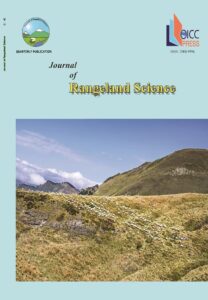Nutritive Value of Rangeland Plants Compared to Medicago sativa
Authors
Abstract
Awareness of the forage nutritive value of rangeland species is important to
provide a balanced diet in order to meet the nutritional requirements of ruminants and to
determine the suitable grazing time and rangeland grazing capacity. Hence, different
laboratory methods were used to compare the nutritional value of Centaurea cyanus,
Fumaria officinalis, Galium tricornutum and Vicia sativa as compared to Medicago sativa.
Whole plant samples just before flowering were randomly collected from different
rangelands of Torbat-e Jam in spring 2018. The means of Crude Protein (CP), Ether
Extract (EE), Crude Fiber (CF), Neutral Detergent Fiber (NDF), Acid Detergent Fiber
(ADF), Organic Matter (OM), Acid Detergent Lignin (ADL), Nitrogen-Free Extract (NFE)
and Non-Fiber Carbohydrates (NFC) of five studied plants were 19.67, 1.79, 19.16, 35.96,
27.20, 86.98, 9.95, 46.36 and 29.56% of dry matter (DM), respectively. The macro and
micro elements were in a reasonable range as compared to Medicago sativa. The in vitro
organic matter degradability (IVOMD), in vitro dry matter degradability (IVDMD), 24 h in
vitro gas production (24 h IVGP), metabolizable energy (ME) and net energy for lactation
(NEl) were the highest in Centaurea cyanus and Galium tricornutum, respectively.
Differences in fermentation parameters (NH3-N, total volatile fatty acids: TVFA and pH)
were observed in the media following incubation of plants. The 24 h IVGP was positively
correlated (P<0.0001) with IVOMD, IVDMD and TVFA and negatively with ammonia
nitrogen (NH3-N; P<0.0001), crude protein (CP; P<0.01) and ether extract (EE; P<0.05).
The results indicated that all rangeland plants studied in this experiment had a favorite
nutritional value compared to Medicago sativa.



